[Mercy wrapped up in her Tortilla Blanket—a delicious Puppy Burrito.]
Last Friday was an absolute chef’s kiss of an Old Austin Day. I went to work early at the museum to lead the monthly arts and crafts sessions I host on the last Friday of every month, sessions dubbed Final Fridays in honor of the wild parties of the same name, thrown by Molly Ivins back in the day. I then left work early to go hop in Barton Springs before heading home to flip out (again) with (still more) joy over my perfect new puppy Mercy. In between the pool and the dog, I made the executive decision to skip cooking up a pot of curry I had planned and get a burrito instead. I love burritos and knew the choice would be a nice culinary exclamation point to my day, freeing me up to keep playing.
A huge fan of efficiency, I put the online order in as I was leaving the Springs, knowing it would be ready by the time I arrived. A few minutes later, I got a call, and caller ID informed me it was the burrito place.
“Hello?”
”Hi. You just ordered a burrito. But you didn’t pick a protein. Do you want meat on that?”
”Wait, the burrito comes with beans, right?”
”Yes, but what kind of meat protein?”
”I don’t eat meat. The beans are fine.”
”So you don’t want any meat.”
“No,” I said, then repeated, “I don’t eat meat.”
I’ve been having variations of this conversation for more than forty years, having quit meat in my late teens. The tone of inquisitors used to be a lot more accusatory, before vegetarianism gained a little traction, way before vegan eating was anywhere near popular. Like Tim Walz trying to convince his vegetarian daughter that turkey legs aren’t meat, I’ve had others try to convince me that “it’s not cheating” if you eat turkey on holidays.
I wasn’t irritated with the burrito clerk for calling to question what she perceived to be my mistake. Actually, I thought it was really nice of her to double check the order. And I had some fun imagining her calling every single person who orders meaty burritos to ask them if they are absolutely certain they want meat, or had they made a mistake?
When The Orange Asshole started ranting still more lies during the debate with our future president—this time about Haitian immigrants pilfering and dining on cats and dogs—the fallout was interesting. The memes were excellent. The fostering of still more hate and fear against immigrants was disgusting. But one angle I haven’t yet seen covered (possibly because I’m not looking that hard), is the curiosity of the accusations. Trumpy Boy knew that making such claims would horrify his Believers, most of whom (perhaps all of whom) have zero trouble wolfing down cows, pigs, deer, chickens and fish on the regular.
I confess that though I started Jonathan Safran Foer’s book promoting vegetarianism, Eating Animals, way back in 2010, I never finished it. I didn’t feel the need to—by that point I’d already been mostly vegetarian for nearly thirty years. But I did get to the part where he points out the absurdity of imaginary line drawing—how meat eaters divide up animals into the ones that are okay to eat and the ones that are not.
Seriously though, if you’re a meat eater, why wouldn’t you eat cats and dogs? They’re plentiful—the shelters are overrun and cats and dogs are slaughtered en masse all the time. Why not eat them?
Before you argue with me, I want you to really consider, if you’re a meat eater, what the difference is between puppy meatballs and veal parmigiana, and also how you have concluded there is a difference?
In the meantime, I’ll tell you this—for a long time, like a lot of people, I considered myself a vegetarian and yet I continued to eat seafood. Why? Because I justified it. I made up a story that fish suffer less, but the truth is, I just loved the taste. Even when I eventually gave up fish, I continued for a stretch with the “I don’t eat critters with faces,” which meant I could continue to enjoy shrimp, mussels (holy shit I loved mussels), and delicious crab rolls on my annual jaunts to Maine. Interestingly, I mostly drew a line at lobsters (though I did try lobster a couple of times). In my narrative, because crabs were smaller, somehow they suffered less when tossed, alive, into boiling water. (This all reminds me of a t-shirt I once saw that said, “Quit anthropomorphising the animals—they hate it.”)
Then, at some point, I had a come to Jesus moment with myself—I was bullshitting me. So I finally gave up all seafood. But I did not give up dairy. Because I love cheese. I love cream in my coffee. I love baking and rely heavily on eggs, butter, and milk. I know there are vegans out there who would roll their eyes at this.
Of course, should I catch such an eye roll, I could point out that there is no such thing as veganism. There isn’t. It’s impossible. Because one cannot cultivate and harvest plants without killing countless little critters, and parts of these critters do wind up in the veggie mix. So, even if vegans aren’t consciously consuming sentient beings, it’s happening. (Fortunately for you and me both, I don’t have the time or interest in exploring here the notion that plants, too, feel pain upon being slaughtered.)
Just as I feel it’s important to note that, during the first dozen years of my sobriety (I’m moving in on 25 years since I quit the drink), I did have a drink or two on a handful of occasions, it’s also important for me to note that for a very brief window in my twenties, I resumed eating chicken. I remember exactly where I was when I started back up, and how delicious that chicken breast was, and how for another year or so I indulged in a lot of chicken, with a special fondness for Wendy’s spicy chicken sandwiches. Then, one day, mid-bite of a massive chicken burrito, I felt complete disgust and stopped again.
I guess all of this is further proof I’m a typical human, typical in that aforementioned habit of justification. Maybe this is what helps me to not judge the meat eaters in my life, of which there are many. Many, many. In fact, if I stopped associating with meat eaters, I might have a dozen friends at best. Still, I’m fascinated by how readily, even eagerly, the majority of people I know eat meat without a second thought. Like my roommate Chad. I asked him recently if he ever thinks about the dead animal part of eating meat. Without hesitation, he decisively responded, “No.”
(Not long after, I ran into Chad in the kitchen one night, and announced I was heading outside to pen up the chickens. Gesturing to the rotisserie chicken on the counter he had pulled from the fridge, he said that he, too, was about to pen up a chicken—in the microwave. We both laughed.)
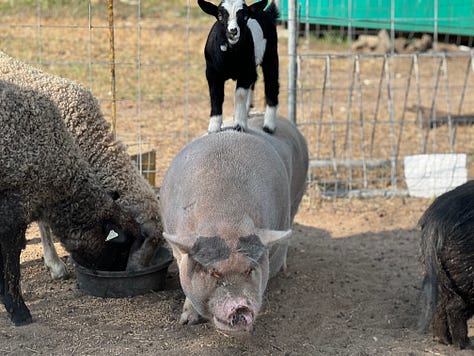

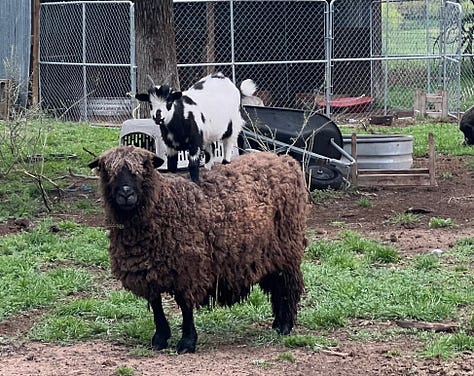
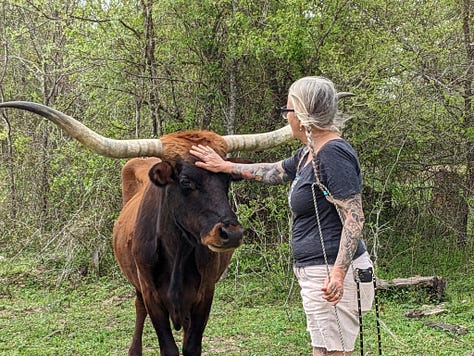
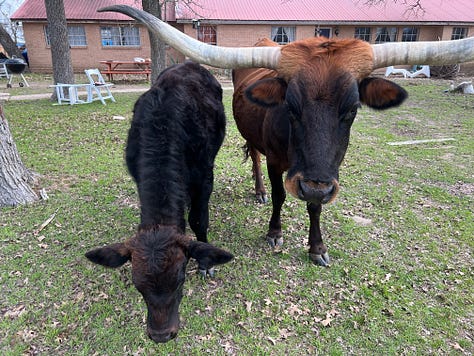
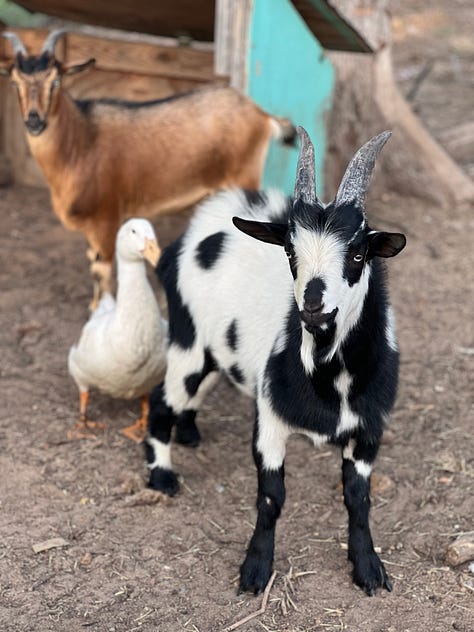
In April 2023, I ripped my hand open on some chicken wire when I was doing my chores. This is not at all uncommon, but the gash was pretty deep and so I headed off to a nearby CVS for a tetanus shot. The kind pharmacist, an immigrant, upon hearing that I’d been working with goats, lit up. He was hoping I would sell him one so he could slaughter it and eat it. He was far from the first to ask me this. Plenty of Uber drivers—also immigrants—make the same request.
I’m not letting anyone eat my goats. But I’m not put off by these requests. Goat might not be a super popular protein choice here in the land of big old steaks, but it is a quite common food choice in many places and among many cultures.
Having lived with farm animals for nine years, I can say that thinking about killing animals to eat them grosses me out more than ever. But I don’t recall meat-is-murder as the catalyst for my own early forays into vegetarianism. I think what actually pushed me in this direction was the fact that, growing up in great poverty, the meat I ate was of the absolute most disgusting variety. Scrapple (ground up pig offal) was a staple in our family. So were the cheapest of the cheap hot dogs. And don’t forget liverwurst.
As the middle child, with five younger siblings, I was the family cook for the longest, and more nights than not, whatever I created involved thawing out a couple of circles of super shitty ground beef, circles I made as part of my Saturday chores. I would haul a long tube of this shit beef out of the fridge, flatten it between sheets of wax paper, and then use the lid of a jar to form the circles, which were then stacked (more wax paper between layers), frozen, and later thawed and mixed into concoctions like Girl Scout Stew, which also contained a box of elbow macaroni and a can of off-brand tomato soup.
I suppose I did miss cheesesteaks for a spell once I quit, but other than that, saying goodbye to meat was, in my memory, pretty easy. To the best of my recollection, I never once have had steak in my life, which I mention because I can’t tell you how many times my carnivorous friends have insisted that if I would just take one tiny bite of a steak, I would understand, really understand the wonders of meat, and resume eating it with gusto. What a horrible thing to suggest, and yet anyone who ever did so seemed sincere, like they really felt they had my best interests at heart, felt sad for me that I’d never sunk my teeth into some rare bloody filet mignon.
It’s not going to happen. In fact, I’m moving in the other direction. For the month of September, while I didn’t go full on vegan, I decided to see just how much dairy I could cut out. Two days of coffee with no milk convinced me this was not something I liked. But I did manage to cut my cheese consumption by at least 70%, and this wasn’t even mildly challenging. Instead, it brought keener awareness to how many delicious options there are that are cheese-free.
I’m curious—even though we all know Trump is a lying scumbag who lives to stir up shit—did a little part of you recoil at the notion of eating domesticated animals? Not to say you believed his claims. But the words he spoke managed to conjure for many of us a visceral reaction at the thought of consuming Fido and Fluffy. Why is that? And does knowing how ridiculously awful so many animals are treated before slaughter, and how many chickens are crammed together and have no joy as they are forced to be egg laying machines—does it ever get to you? Does the climate change piece of it play in, how meat consumption is a huge factor in the ongoing rape of the planet?
Uh-oh. It sounds like I’ve slipped into guilt mode, accusing you meat eaters of ruining everything whilst I sit upon my high horse, sipping my kale-packed green smoothies with a smile of superiority upon my vegetarian face. Not true, though I do think it would be cool if more people just said no to meat. Mostly, as ever, I’m interested in a conversation here. What do you eat? What don’t you eat? What stories do you hold onto that shape your choices?
(Oh, and ps—Did you notice how I didn’t bother mentioning my excellent collection of leather goods?)
NOTES:
Thanks for reading y’all. If you’re a free subscriber, please consider bumping up to paid. $5 per month. It helps a lot. Other ways you can support my art—share this substack with someone you think will dig it. BUY MY NEW BOOK. It’s called Grok This, Bitch, and it’s very funny, I promise. To buy a book you can Venmo me: @spike-gillespie. $10 gets you an e-copy, $30 gets you a print copy (that includes postage).
My next FREE Writing Workshop at Hampton Branch Library is tomorrow, October 1st. These always fill up so if you want a spot please REGISTER HERE.
If you dig writing and want to be part of a cool online writing group, check out my other substack: WriteWithSpike.substack.com.
The deadline to register to vote is October 7. Please register. Please vote. And if you’re already registered, please check to be sure that you weren’t kicked off the rolls by Satan. Vote.org Thank you.

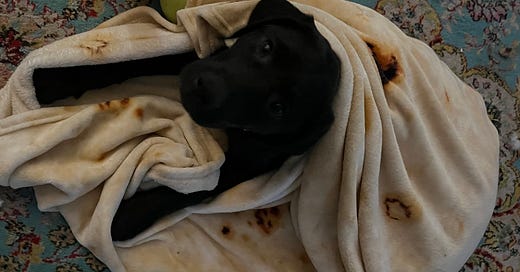



This is so great. Thanks for always helping remind me that the proper follow-up to any essay or "TED talk" is to ask what people's experiences are and why they agree or disagree -- I am trying to get better at this myself, and in fact I have finally started working on some opinion essays that I'm excited to get feedback on when they're ready to see the light.
I've always eaten meat. Mostly thoughtlessly while growing up (despite being in a secular hippie homeschool group in which there were many vegetarian/vegan families and some of them ridiculed/lectured those of us who ate meat), but in college I read Barbara Kingsolver's "Animal, Vegetable, Miracle," Michael Pollan's "Omnivore's Dilemma," and "Nutrition and Physical Degeneration" by Weston Price (a lot of his current followers subscribe to wacky theories unrelated to his research, but his adventures were interesting and timely to undertake as globalization started to make ancient food traditions harder to study firsthand), and all of these convinced me that eating meat is optimal for the human body.
Animals eat other animals without a second thought; our curse as the most intelligent, most empathetic animal on the planet is that we do think about and care about the feelings of other animals, and that sometimes makes it emotionally harder for us to eat the way we evolved to, namely omnivorously. Some animals are more repulsive to imagine eating than others, but this is probably because dogs and cats are not prey animals (they're snuggly, relationship-based hunters, like us), and very few cultures are okay with eating carnivores. Judeo-Christian- and Muslim-descended cultures tend to have more prohibitions against it because of conventions that originally came from religious texts, but there are people in Asian and African cultures that still eat dogs as readily as Westerners eat beef and chicken (you can research this yourself, but you will probably find it grim), so our tendency to find it abhorrent is honestly a cultural bias descended from historical religious convention.
Meat can be cultivated in a sustainable way (there's a whole farming approach that rotates cattle and chickens through pastures to restore nutrients to the soil, and even natural fertilizers come from animal waste -- a vegan world would not be able to accomplish this without tremendous amounts of manufactured chemicals), and animals can be slaughtered/processed in a more ethical way (see Temple Grandin's work if you haven't already). After reading the aforementioned books, I challenged myself to participate in animal processing (shooting a deer, slaughtering a chicken) so that I wouldn't be a hypocrite to continue eating meat; I did it, and I didn't enjoy it, but I think it was important. My thoughts about this are complicated, because I also think that humans should be working on becoming less numb to violence, so having everyone kill and eat animals to experience the process doesn't really help with that goal. I'm still trying to figure out the ideal strategy, but I think that raising sustainable, ethical meat and making it more affordable and accessible is the best way to restore soil, provide nutrient-dense food for the most people, and fend off the health problems that come from malnutrition and overindulgence in carbs/fat. As usual, I walk a moderate line on this and piss off the extremists on all sides (vegans and vegetarians think I'm a monster for advocating meat-eating, while paleo and carnivore people think that eating small servings of meat is unhealthy and giving in to The Man, and ethical purists don't like that as a working mom I indulge in a non-zero number of Taco Bell tacos and drive-through burgers every year).
I know people my parents' age who were vegetarians for decades and recently had to go paleo/carnivore due to health problems, and I know vegans who had to start consuming animal products because their nutrient deficiencies made them sick...probably all of us know people like this, who took up eating meat because thyroid issues or autoimmune conditions necessitated it, or they were horribly sick during an attempted vegan pregnancy, etc. Lab-grown "meat" has ended up being an expensive and environmentally-disastrous failure, so we have to figure out how to make peace with being omnivorous animals, even though it is hard to handle sometimes.
Just remember that our beloved pets don't care one iota about eating dead animals -- where they came from, how they suffered, any of it -- and that's okay. Life is a cycle, and we all survive by eating other living things. Humans are the only ones who struggle with accepting this truth; we could probably stand to learn some humility and existentialism from the rest of the animal kingdom...
I still eat meat, but as a born and raised farm kid, it was hard to avoid. We bred meat cattle, and a couple of times when my sisters and I were in elementary school, bottle fed a few orphans (one mama died, one rejected, and the 3rd was the 'small twin' which is usually a death sentence) Unironically, once they were old enough to graze and eventually, sold as yearlings, we DID wonder as we ate our hamburgers if we were consuming our bottle babies, and refused beef for awhile...
I guess growing up where everything on the farm plays a role and everything is considered part of the food chain played a large part of how I, personally, see my place in it. I don't eat a lot of meat, but at the same time, I have a train wreck of a digestive system (thanks to a medical condition I was born with and was aggressively treated for as a toddler) and all but black,red and organic soy beans are off limits, as well as wheat, most corn products (I will die before I give up corn tortillas), and ALL dairy. I do thank the vegans for their vegan 'cheese' and alternative milks, although one could argue that they are HIGHLY processed which diminishes both they nutritional and environmental value)
Cattle would most likely NOT EXIST at all if we didn't use them for food, even though beef is the most environmentally damaging as an industry, cattle (or their wild cousins we slaughtered for no GOOD reason) do/did/can provide a link in the perpetuation of the environment in which they exist, unfortunately, they take up too much room for us humans and DOG FORBID we allow their natural predators to live among us and handle the population...(they literally 'till the earth with their hooves' and fertilize it with their poop, but only if they eat nothing but grass, which modern meat cattle don't)
That said, I don't judge anyone for their choices to feed themselves, although most overprocessed garbage is just that, and as Joan Cusak's character said to her brother in Better Off Dead, "How can you eat that crap? There's no food in your food!"
Indeed.